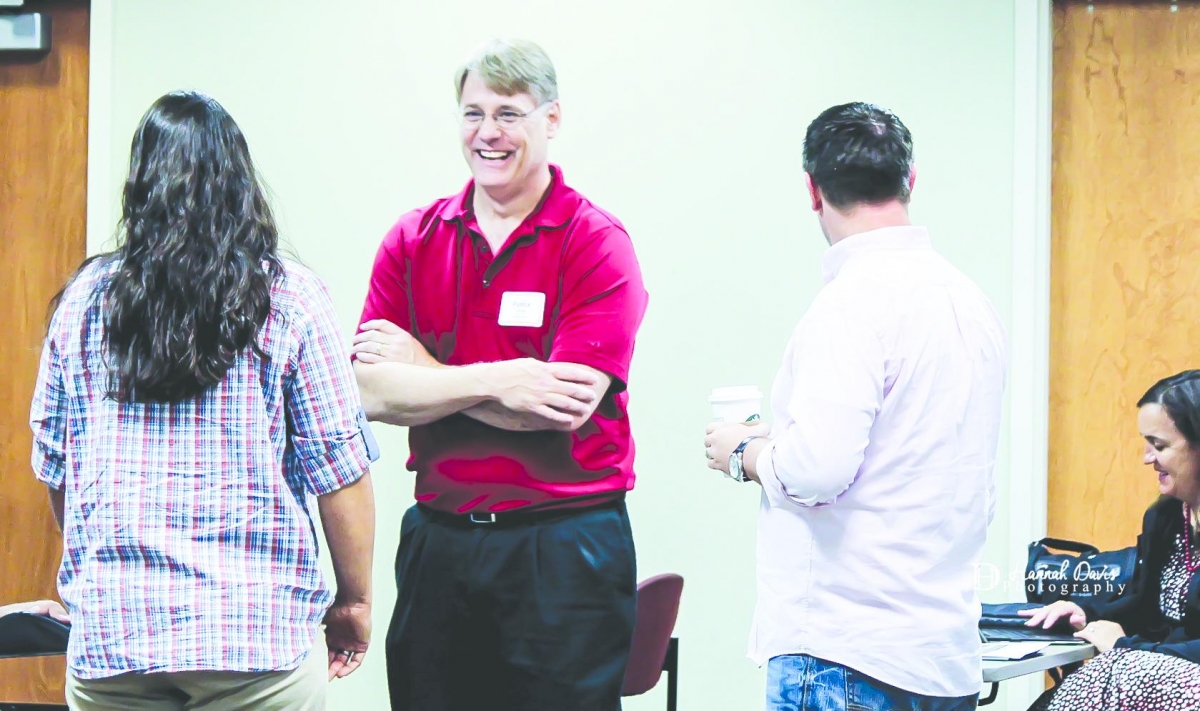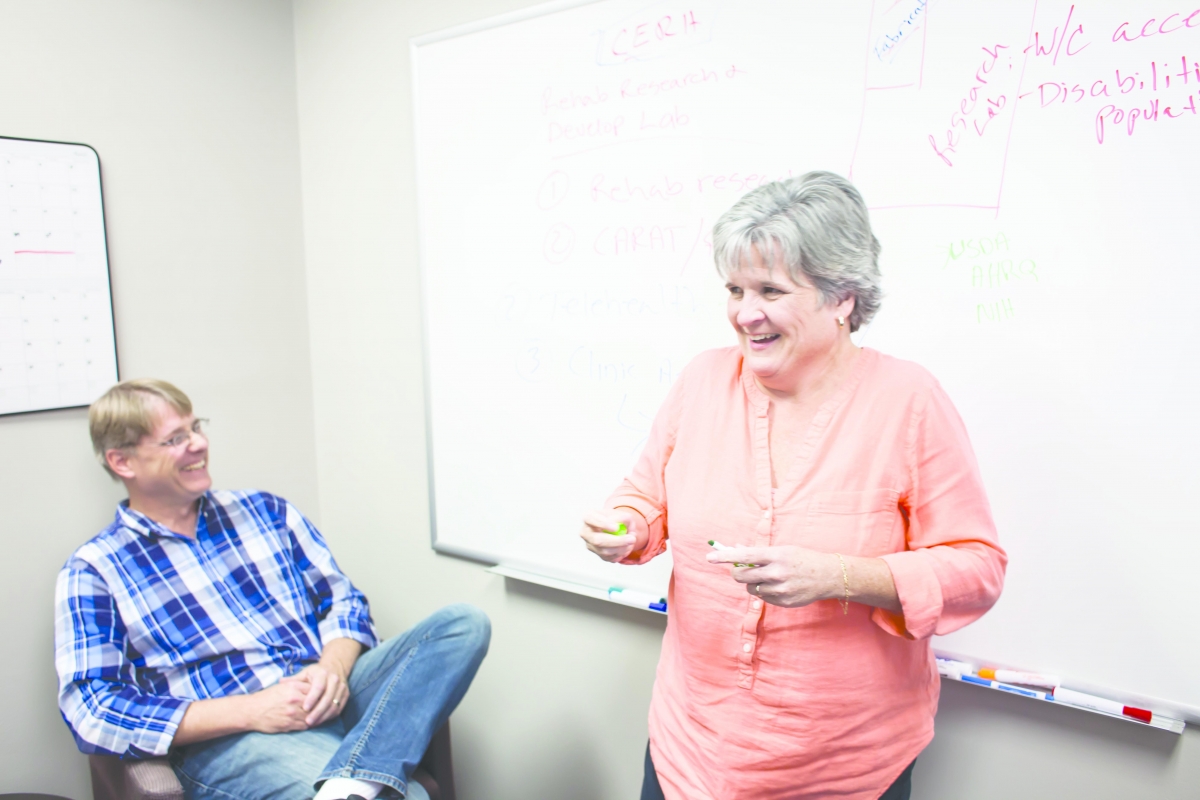

Connecting the Right People
Pat Kitzman’s ability to build a high-functioning team of diverse members is perhaps his biggest advantage in his new role as Associate Dean of Research for the College of Health Sciences. He learned his team-building skills not through formal training, but through feet-to-the-fire experience building a network to serve the community.
Kitzman is a co-founder of the Kentucky Appalachian Rural Rehabilitation Network (KARRN), which was established in 2008 and is a thriving collaborative team dedicated to improving outcomes and quality of life for those affected by neurological conditions, such as spinal cord injury, stroke, and traumatic brain injury.
“If you see a problem, you have two options,” Kitzman said. “You can either do something about it or don’t. If you don’t do something, you become part of the problem.”
The idea for KARRN began as a question posed by Kitzman and KARRN co-director, Dr. Beth Hunter, who was at Cardinal Hill Rehabilitation Center at the time and is now an Assistant Professor in Gerontology at the UK College of Public Health. Patients are treated for a neurological injury and recover to the point of being sent home, many to a rural Kentucky community. What then? How do those with life-changing neurological conditions fare once home?
“We looked at the same problem from different perspectives,” Kitzman said. “As a patient, caregiver, health care provider, what are the barriers they face?”
Getting all stakeholders together in a room is a feat in itself, but necessary, Kitzman said, and it is how KARRN was born. A group of community members, those with neurological conditions, health care providers, and caregivers came together on May 21, 2008 and discussed barriers, gaps in services, and available resources. What they discovered was a tremendous amount of resources across the Commonwealth, but those resources were not connected and not easily accessed.
“I think the reason we were so successful is that we never set out to create this,” Kitzman said of KARRN. “We are always sincere in our efforts. When we ask for help, we’ve never been turned down.”

In addition to sincerity and the best of intentions to help the community, Kitzman said a key to KARRN’s success is connecting with the right people.
“We always look for the people who can get the job done. Those are the people you connect with,” Kitzman said.
In fact, it is rare that it takes longer than 15 minutes for someone in the KARRN network to offer assistance or a solution when a call for help is sent via email.
“I don’t even think we know the extent of our capabilities yet,” Kitzman said. “KARRN shows that a concerted effort makes the biggest impact. We cannot succeed alone.”
Asking the Right Questions
Beyond knowing how to connect the right people to develop solutions for the community, Kitzman has a vital skill in demystifying research and helping others see creative ways to use their expertise in research.
“We have faculty who are teaching about new treatments, then as clinicians they treat patients,” Kitzman said. “Then they have an outcome. Did the treatment help or not? Research is essentially asking a question.”
Helping College faculty find a good match in research, based on what they do best, is one aspect of his new role Kitzman looks forward to most. Kitzman, who has taught for 16 years and continues to lecture, is a strong believer in what he calls the teaching-research-community partnership continuum – it all ties together.
“How do we teach students who learn in a different style than previous generations?” Kitzman asked. “How do we prepare them as competent health care providers in a constantly changing landscape? You can tell when something clicks for students, and when they aren’t getting it. As a teacher, you adjust. It’s like an intervention, and you will have an outcome.”
The College of Health Sciences has a major advantage. With nine disciplines, and many faculty who are also active clinicians and researchers, it can play at many levels, according to Kitzman.
“Research informs teaching; students become better health care providers; patients receive better treatment; health care is improved,” Kitzman said.

Creating the Right Culture
In addition to embracing teamwork and creativity in research, Kitzman will lead the Office of Research on two fundamental tenants: respect and common courtesy.
“Respect and common courtesy built an entire network,” Kitzman said, referring to KARRN.
He says the Office of Research will, of course, have an open-door policy, but he wants to go beyond that, building a climate of ideas, collaboration, and College and community engagement.
“If the community doesn’t buy in, research won’t work. We want to go to people, instead of always asking people to come to us. It shows respect for them and for their time,” Kitzman said. “The Office of Research provides a service to the College. We have an amazing team in place to facilitate our faculty’s research efforts.”
He also hopes to further diversify the College’s research portfolio, by seeking funding from foundations and other less-tapped sources.
“Funding from traditional sources such as NIH funding is diminishing,” Kitzman said. “It’s a small pond to fish in. When you open up to creative sources for research and grant funding, you increase the chances of success.”
Kitzman’s outlook on research, work, and life is perhaps best summed up by a quote on his office wall from The Last Lecture author Randy Pausch: “The brick walls are there for a reason. The brick walls are not there to keep us out. The brick walls are there to give us a chance to show how badly we want something. Because the brick walls are there to stop the people who don’t want it badly enough. They’re there to stop the other people.”
Kitzman’s enthusiasm and positivity are infectious, but tempered with realism. He expects barriers in his new role, yet sees them as a normal part of life. As father to three adopted children, two of whom Kitzman and his wife fostered, he knows that life is overflowing with barriers – if that is how one chooses to view it.
“We would not have considered quitting, when things were tough,” Kitzman said. “I can’t even imagine what would have happened if we had quit. It wasn’t even a possibility.”





